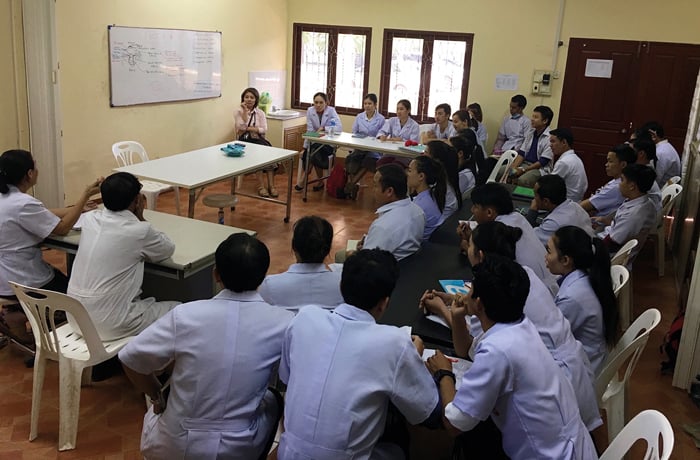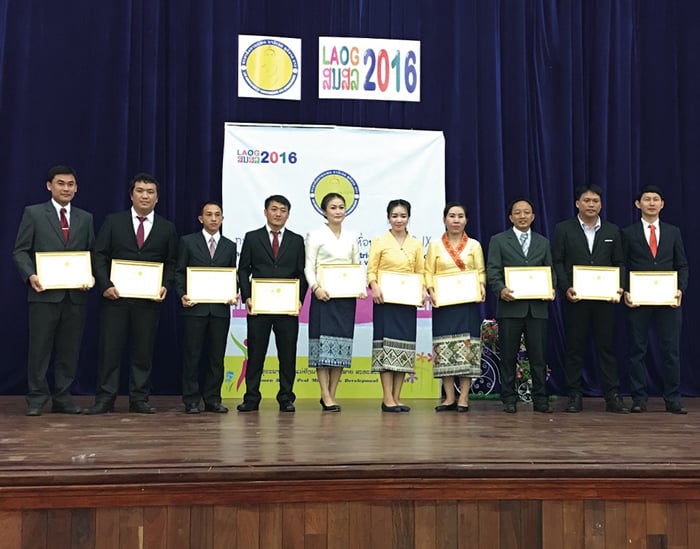While most postgraduate specialist training programs around the world incorporate a requirement for involvement in a research project, there seems to be little evidence of the true value of the exercise. It has what might be called ‘face validity’, meaning that you would think it is a good idea, given that we require doctors to practice evidence-based medicine and to understand the processes whereby that evidence is gained, as well as being able to assess the validity of the research on which the evidence is based. We would not think of teaching surgery only in a classroom, but rather also hands on in the operating room. Furthermore, experience of research might lead more of our trainees to participate in research after they graduate from the course. There is not a lot of evidence to support these hypotheses.
We have been working together in Laos, a developing country with a rudimentary postgraduate training program in obstetrics and gynecology, and watching trainees trying to master even basic research programs, we are sure that there are better ways of using that time. Reflecting on the situation in Laos has led us to question whether research projects are really appropriate, even in other more developed countries.
We should want our specialists, following graduation, to be able to examine their own performance and that of their institutions in an ongoing and critical manner. We do not want them to see this type of critical evaluation of practice as a separate compartment from their day-to-day work, but rather as one component of a specialist’s role. For this reason, audit rather than research seems the most appropriate activity for postgraduate trainees to undertake. An added bonus is that in Laos we lack basic data on many aspects relating to the practice of our profession, so data gathered has the potential to become a valuable tool in planning and administering services here.

Figure 1. Morning report – minor audit of previous day’s activities.
It has been a difficult battle to convince those who oversee (but actually contribute little to) the postgraduate training program to change the emphasis from research to audit, but we have made major steps, leading by example. We had been developing the concept at our own hospital for several years in the face of skepticism from the university, but a breakthrough came in 2015 when one of our trainees presented a paper on her audit of the value of ultrasound in triaging breast masses at our hospital, to the Lao Obstetric and Gynecologic Society annual meeting. She had worked very hard on her presentation and it was met initially by stunned silence as people came to see what she had done. Then, one of the very senior specialists got up, looked at her in amazement and said: ‘Did you really do that work?’
Bolstered by that experience, we developed a number of other audit activities that were now, reluctantly, acceptable to the university. We had two presented at our 2016 meeting, and Dr Rupert Sherwood, past President of RANZCOG, used his guest speaker lecture to talk persuasively about audit. A Thai specialist gave a valuable talk detailing some of the large number of papers he had published based on data collected in audits, and I spoke about the concept of audit as an essential quality of specialists. So our final-year trainees are mostly doing audits, though sadly four of them have been assigned projects that seem designed to gather data to be used by a senior colleague in his PhD project.
The two audits presented last year were ‘Pathways to the diagnosis of cervical cancer at Setthathirath Hospital’ and ‘Causes of abnormal genital tract bleeding in peri and postmenopausal women seen at Setthathirath Hospital’. We were aware most women we saw with cervical cancer had been to clinics and other hospitals before the diagnosis was made, but the audit gave us a much clearer view of just what the issues were. Patients were ignorant of the significance of signs and symptoms and many had not had vaginal examination, but instead had been reassured by a normal ultrasound that nothing was amiss. One woman had undergone several ultrasounds and a CT scan without examination and told there was nothing wrong. Even when vaginal examinations were performed, cancer was rarely recognised; Pap smears were often done from what should have been obvious cancers, and frequently the smears showed only blood and inflammatory cells with the comment ‘no evidence of malignancy’. We are continuing that audit, with the intention of presenting the expanded results again this year to our meeting, but even before that happens we are seeing evidence, which the audit will hopefully confirm, of changed practices among those who have recently graduated. We are also continuing the audit on peri and postmenopausal bleeding to gather a clearer picture of the problems that have never been examined before in this country.
An audit of ectopic pregnancy is well underway. One of the very important findings so far is that roughly half the women had used a readily available abortifacient drug, ‘Ya Jin’, to try to procure an abortion, thinking they had intrauterine pregnancies. This is a very serious situation in a country where most of the population live in rural and remote areas where ectopic pregnancies can easily be fatal. Another finding is that virtually all the ectopics are ruptured before diagnosis and the treatment has invariably been salpingectomy rather than any form of conservative treatment.
Many of the women who undergo hysterectomy do so for abnormal bleeding that has either not responded to conservative treatment or for which the women will not accept medical treatment. Many have fibroids, and abnormal bleeding is invariably blamed on fibroids, no matter how small. So another audit is looking at the endometrial pathology in women undergoing hysterectomy for fibroids, and its correlation with symptoms. Another of our projects is examining the adequacy of information collected in the charts of women who deliver in our hospital, an exercise that we hope will improve our data collection and record keeping, which always seems very poor when complications develop.
There is a rudimentary maternal mortality review process in Laos, though it does not cover more than a small proportion of maternal deaths and does not produce useful reports to help improve practice. It seems more designed to assign blame and determine compensation. After a recent maternal death during a postpartum hysterectomy at our hospital that seemed to result from amniotic fluid embolism followed rapidly by disseminated intravascular coagulation (DIC) and death, we decided to commence an audit of ‘near misses’ and major complications occurring in our hospital’s obstetrics and gynecology unit. We are currently analysing several cases. In one case, junior specialists performed a third cesarean section on a woman with an anterior placenta accreta through a small Pfannensiel incision and low transverse incision. The woman bled very heavily, developed DIC and nearly died. Another woman admitted for presumed ectopic had delayed surgery due to confusion about the diagnosis and the reluctance of anesthetists to allow surgery on the very sick woman; when the abdomen was eventually opened she had an invasive mole perforating the fundus causing a hemoperitoneum. She also developed DIC and required a ‘pack and go back’ approach. We hope that detailed analysis of these cases will improve the performance of all involved in our clinical care.
We also plan to invite officials from the Ministry of Health and the Mother and Child Institute (who are responsible for national community health projects in reproductive medicine) to spend a day with us looking at the data our audits produce, basic as it is, so that they can hopefully plan strategies to address at least some of the issues the information raises. Thus our simple audits may help improve healthcare in Laos.
While it may seem that this audit activity is not a suitable substitute for research in training programs in western countries it may be time to take a practical and realistic look at the potential benefits of these simple activities to both the daily practice of specialists and units, even in more privileged countries than ours.

Figure 2. Each year about 10 trainees graduate as specialists in obstetrics and gynecology after a three year training program.






Leave a Reply